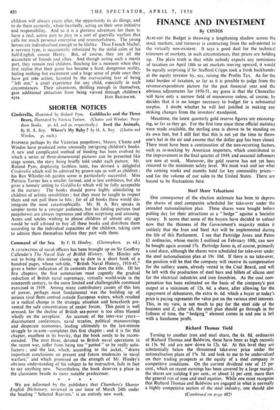Command of the Sea. By F. H. Hinsley. (Christophers. 7s.
6d.)
A GENERATION of naval officers has been brought up on Sir Geoffrey Callender's The Naval Side of British History. Mr. Hinsley sets out to bring this minor classic up to date in a short book of a hundred pages, whose sub-title, "British Naval History, 1918-45," gives a better indication of its contents than does the title. Of his five chapters, the first summarises most cogently the gradual reduction of British naval supremacy, virtually world-wide in the nineteenth century, to the more limited and challengeable command exercised in 1939. Among many contributory causes of this loss of power, perhaps most fundamental was the building up of serious rival fleets centred outside European waters, which resulted in a radical change in the strategic situation and henceforth pre- vented the safe concentration of major forces. This point is well stressed, for the decline of British sea-power is too often blamed wholly on the aeroplane: An account of the inter-war years— disarmament conferences, naval treaties, political manoeuvrings and desperate economies, leading ultimately to the last-minute struggle to re-arm—completes this first chapter ; and it is for this chapter, excellent in its brevity, that the book needs to be recom- mended. The next three, devoted to British naval operations in the recent war, suffer from being too " potted " to be really satis- factory; and the last, which, according to the jacket, "draws important conclusions on present and future tendencies in naval warfare," and which promised on the strength of Mr. Hinsley's obvious understanding of his subject to be instructive, fails in fact to say anything new. Nevertheless, the book deserves a place in the classroom beside its more notable predecessor.
* * * * We are informed by the publishers that Chambers's Shorter English Dictionary, reviewed in our issue of March 24th under the heading "Selected Reprints," is an entirely new work.






































 Previous page
Previous page